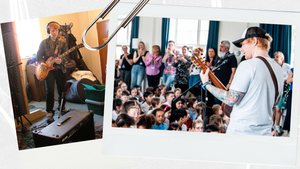The UK government is abandoning the so-called ‘EBacc’, or English Baccalaureate, a controversial initiative that prioritised certain subjects at GCSE and then assessed schools based on how students performed in those subjects - but excluded creative subjects like music.
As a result, after the introduction of the EBacc in 2010, creative subjects, including music, drama and art, were increasingly deprioritised in state schools in England, with the result that by 2024 entries for arts subjects at GCSE had declined by 42%.
The EBacc is being axed as part of the government’s new Curriculum & Assessment Review, which also makes other commitments to ensure young people have access to ‘arts and culture’ through the education system.
The changes - welcomed by music and creative industry groups and a certain Ed Sheeran - come ahead of the Music Industry + Music Education Conference presented by CMU’s Pathways Into Music Foundation in Manchester later this month. Music accreditation and qualifications in school, and beyond, are one of the key topics in the spotlight at the conference.
The music industry has long criticised the UK government for under-valuing and under-funding arts education in schools. In the last year, Ed Sheeran has been particularly vocal after setting up a new foundation to support music education. Earlier this year he sent an open letter to Prime Minister Keir Starmer urging the Labour government to “repair decades” of damage caused by past governments.
The PM wrote to Sheeran earlier today insisting that the new curriculum review “places creative subjects firmly at the centre”. The government, he says, is “revitalising arts education” and “strengthening music and drama”, adding “we will make sure every child has access” to arts and culture so that “creativity isn’t a privilege, but a right”.
Responding to Starmer’s letter, Sheeran took to social media to welcome “the first change to the music curriculum in over ten years”. This, he says, “involves diversifying the music genres taught in schools and removing outdated systems that stop kids from studying music and the arts as part of their school day”.
“There's a lot more to do to support music education, especially our music teachers”, he concludes, but the curriculum review “is a step in the right direction”.
The EBacc basically prioritised certain subjects at GCSE, with creative subjects like music not included. School performance was measured on success in the subjects included in the EBacc, resulting in subjects like music being deprioritised.
Since being introduced in 2010, the EBacc “has done immeasurable damage to music and creative subjects”, according to Deborah Annetts, CEO of the Independent Society Of Musicians. “For the government to now acknowledge the damage the EBacc has done to creative subjects and scrap it is truly a historic moment and one that should give us hope for the future of education”.
Creative UK, which brings together organisations from across the wider creative industries, has also welcomed the axing of the EBacc and the other commitments in the curriculum review. With the changes, says Creative UK CEO Caroline Norbury, ministers have shown they are “willing to back the creative pipeline that we must build in order to maintain our world-leading status in the creative industries”.
Meanwhile, performer union Equity says “the government's commitment to scrap the English Baccalaureate marks a significant step towards increasing access to arts education for all”, adding that ministers must now “build on this welcome move and continue to remove barriers to careers in the arts across the whole system”.
Creative UK also states that more must be done to build on the curriculum review. It specifically raises concerns about recent government proposals regarding education for those sixteen and older, which it says “risk weakening routes into the UK’s creative industries”.
Norbury continues, “we can’t build a pipeline of creative talent that then leaks at the school gate. Reform only works when the stages connect”.
But if ministers ensure “that post-sixteen policy builds on, rather than cuts across, what schools have just regained”, she says, “we can create a system that educates for imagination and equips for impact and that would be one of the most powerful investments this country could make”.

